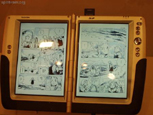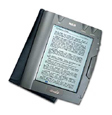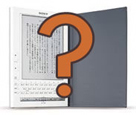




Bob wrote a couple of days ago about the new French Cybook – a sleek, but heavy, new ebook reader. Everyone interested in serious electronic books is waiting for the ideal device to come along, so that screen-based reading will be as comfortable paper-based. The benchmark for most is: “can I take it into bed with me?”  This is a very serious question (people who sleep with their laptops notwithstanding). But my hunch is that these successive generations of reading devices are missing the point. Who wants a device that is just for reading books? I don’t have a bag devoted exclusively to toting paper books. I carry many things together – books, pens, magazines, cds, maps, pictures, food etc. People are already using their cell phones for just about everything.
This is a very serious question (people who sleep with their laptops notwithstanding). But my hunch is that these successive generations of reading devices are missing the point. Who wants a device that is just for reading books? I don’t have a bag devoted exclusively to toting paper books. I carry many things together – books, pens, magazines, cds, maps, pictures, food etc. People are already using their cell phones for just about everything.
I think what we’re waiting for will be descended from laptops. They will likely resemble tablets, or even scrolls. It’s hard to predict. But take a look at this nice post at Word Munger from last year. I think this is on the right track.
Would love to hear some ideas….
if:book
A Project of the Institute for the Future of the Book

Yes! Your comments and the link to Dave Munger are really useful. It is an electronic device maximised for reading. Such a device will have less and less reference with the book prototype, but will be highly refined to deliver content in a composite, screen based reading mode.
Why simulate page turning as a navigational motif? Simulate the kind of reading associated with blogs, with emailing and with thumb texting.
And let’s not call it an “ebook”. Let’s call it an “eReader”.
I see no need to keep the term “book” insulated from these new developments. The book has always been an evolving concept. Breaking up scrolls into discrete pages is a great innovation and can work well in a digital context as well.
We are at an incredible technological and cultural juncture. I think we’ll do best if we listen carefully to the conversation that occurs between old and new forms. It’s a dance of resistance and absorbtion that is beautiful to watch.
What do we value books for?
There are bookstores that sell books by the inch. In the 19th century, many households had faux bookcases, with no books, just the spines. Even today, I have an antique room divider painted with trompe l’oeil books. The New York Review of Books has ov…
Wow! Take a look at this new polymer vision technology developed by Philips.
Also article.
Advent of the eReader
Let’s not call it an eBook, let’s call it an eReader. No need for reference to the book prototype, no need for the page turning motif. Maximize the device for the kind of reading associated with blogs, with emailing and thumb texting. Maximize it for images, audio and video. The eReader is for those navigating the composite, screen based reading mode.
The eBOOK revolution is so over.
If the eReader needs a precursor it would be television, if it needs a prototype it is the cell phone. The book is off to one side of the whole emergence. In fact the eReader is emerging as a counterpart of television and cell phone developments. In television the increasing definition and accentuated clarity of the screen presentation provides a similar objective for the eReader. With cell phones the wireless connectivity is an eReader objective. Cell phones also have multiplicity of functions including digital photography, keypad texting, and web searching. Again, the eReader must also aspire to multiple function.
But there is one frontier exclusive to the eReader as it engenders the skills, the aesthetic, the technology and the scope of a new composite reading mode. Transcending parent reading modes in the verbal/visual, written and print domains and encompassing their children including radio, television, zines and audio and video playback, the eReader will define history’s first screen based composite reading mode.
So the future of the eReader, when evolved, will not also relate the future of the book. These two decisive reading formats are on their own tangents into the history of communication. Their early interactions will dissipate and, in the future, we wonder why anyone would have considered an electronic book or a screen based text. These charming hybrids will shortly be impossible.